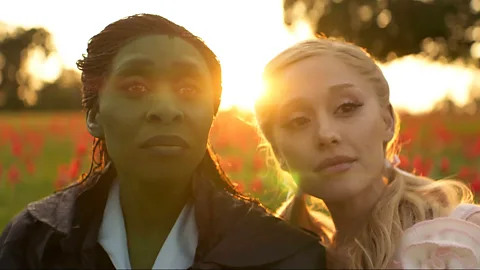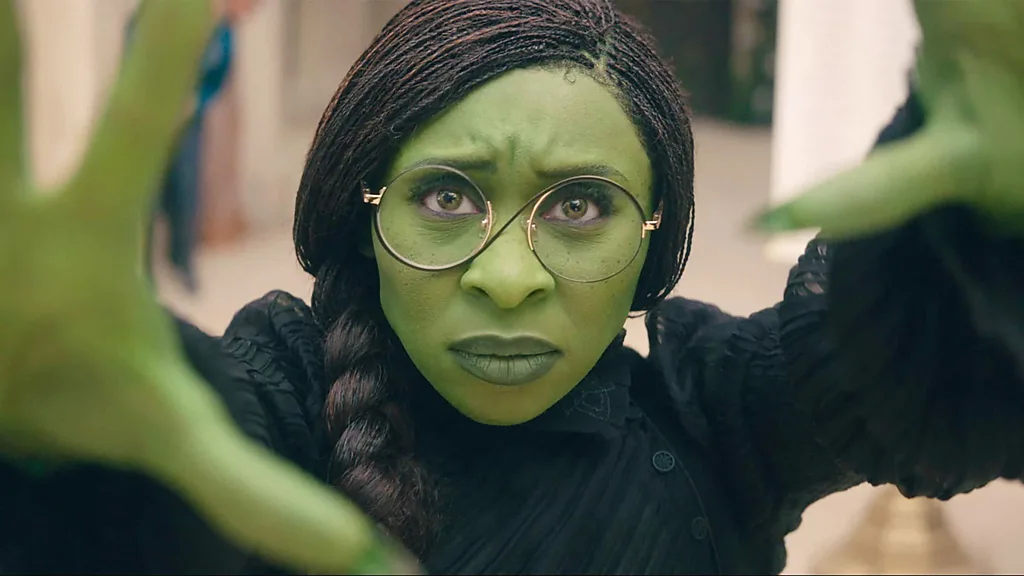When author Gregory Maguire was a child, he and his siblings would regularly act out scenes from the classic 1939 film, The Wizard of Oz. They’d even change the story and its perspectives, just to keep themselves entertained. “The material was so malleable that you could change it and it would still be recognisable,” Maguire tells the BBC. Little did he know that these childhood games would one day feed into his life-changing novel, Wicked: The Life and Times of The Wicked Witch of the West.
Spoiler alert: This article contains spoilers for the plot of Wicked.
By the early 1990s, Maguire was a well-respected children’s author, who had received “good reviews, but no big sales”, he says. After working as a professor at the Simmons College Center for the Study of Children’s Literature in Boston, and then co-founding the non-profit educational charity, Children’s Literature New England, Maguire wanted to have a go at writing for adults. “I thought that I had to throw everything that I cared about into this book, because I would never write another one,” he says.
Maguire knew that the topic he wanted to explore in the novel was the nature of evil. Specifically, what does being “evil” mean? Are we just characterising certain types of behaviour? Are we assessing the decay and corruption of someone’s moral fibre? Maguire knew that if he was going to get readers on side, he’d have to weave the subject into “an arresting plot that would engage hundreds of thousands of people around the world”, he says.
The green witch is evil. We all know she’s bad. But if you ask a person why she is evil, they can’t answer. The brilliance of Maguire’s book is that he interrogated that very question – Dana Fox
That’s when Maguire thought back to The Wizard of Oz. In particular, Margaret Hamilton’s portrayal of the Wicked Witch of the West, and her brief interactions with Glinda, played by Billie Burke, towards the start of the Victor Fleming film. “I thought to myself, ‘They know each other. They’ve crossed paths before. They went to school together!’” Creating this scenario in his head provoked Maguire to laugh out loud. “I thought that was so funny. Because it was such a good idea.”
Maguire’s assumption proved to be right. Wicked’s revisionist exploration of both L Frank Baum’s 1900 children’s novel The Wonderful Wizard of Oz and the 1939 film adaptation takes an extensive look at the life of the Wicked Witch of the West. Maguire named her Elphaba, which is a play on the initials of the original author. In the book, we see the reasons why Elphaba is considered evil, as societal perceptions and circumstances force her to act in ways that are deemed villainous.
Born with green skin, she is regularly pointed at and laughed at. This prejudice makes her feel so much like an outcast that she ostracises herself from other people. After discovering that the country’s sentient, speaking animals are being locked up, Elphaba approaches Oz and asks him for help. But Oz dismisses her concerns, as he wants the people to unite in the belief that the talking animals are their common enemy. Elphaba goes into hiding, and joins an underground group to try and protect the animals. Oz then uses propaganda to tell the rest of the country that Elphaba is evil, even though she’s fighting for justice and to protect the vulnerable. She then reacts with rightful rage against the death of her sister, and Glinda giving her family’s shoes away to Dorothy.

While it wasn’t a bestseller when it was released in 1995, the book was a word-of-mouth hit, says Maguire. “Every year it would sell more than the year before. It was the genuine definition of a sleeper hit.” Stephen Schwartz’s decision to adapt the book into a musical made it even more popular. The musical version of Elphaba is more misunderstood and kinder than the increasingly dark and bitter version in the book. Wicked has been playing in New York since 30 October 2003, making it the fourth-longest-running Broadway show of all time.
Such success meant a Hollywood adaptation was inevitable. But much like the musical, Wicked the film (part one), deviates from the book in several ways, perhaps to make it more accessible for mainstream audiences. Rather than being entirely Elphaba (Cynthia Erivo)’s story, we see Glinda (Ariana Grande)’s perspective, too, as the story revolves much more around their friendship. The film unfolds at Shiz University in the Land of Oz, where Elphaba and Glinda are forced to share a room. While they start off hating each other, they quickly become friends, and they both fall for the same handsome prince (Jonathan Bailey). But as they continue their studies, they discover the sinister plot unfolding in the Land Of Oz, which is forcing the country’s talking animals to go into hiding.
Wicked’s continued resonance
Dana Fox, who co-wrote the film with Winnie Holzman, says part of Wicked’s success is down to how Maguire twisted the expectations of the audience. Before the book, everyone would insist, “The green witch is evil. We all know she’s bad. But if you ask a person why she is evil, they can’t answer,” Fox tells the BBC. “The brilliance of Maguire’s book is that he interrogated that very question.”
While Maguire was contemplating these themes and his potential story for Wicked, an incident occurred that made him think more deeply about the nature of evil. On 12 February 1993, two-year-old James Bulger was murdered by two 10-year-olds in Merseyside, England. As Maguire watched reports of this tragedy unfold on television, people on programmes and over dinner would discuss the terrible crime these boys had committed. It made Maguire, who was living in London at the time, wonder, “Where did the decision to do what they did come from? Where did that capacity for evil come from?” As the murder continued to be analysed, and intellectual discussions continued about whether “sociological, biochemical, or spiritual reasons were to blame”, says Maguire, he realised that the atrocity fed into “everything he had been considering” about Wicked. “That sad, sad event proved to be a catalyst for me to push forward,” says Maguire.



